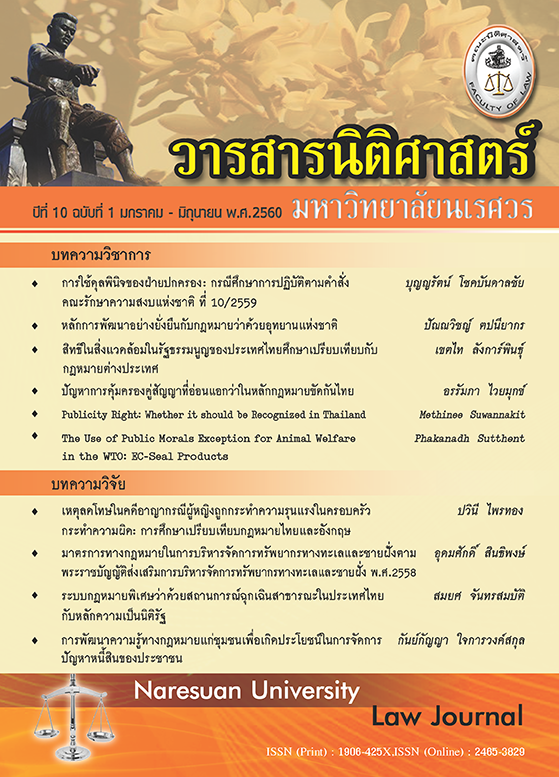The Exercise of Administrative Discretion: The Case Study Regarding the Implementation of National Council for Peace and Order, Order no.10/2016
Main Article Content
Abstract
National Council for Peace and Order (NCPO) has issued the order no.10/2016 due to the state policy regarding the reform of educational system. Under the NCPO order no.10/2016, three committees were established which were the committee of the ministry of education for driving educational reform in the region, the Provincial Committee for Education and the Provincial Subcommittee for Education. During the past year, there were several problems regarding the implementation of the NCPO order no.10/2016 which were: (1) the administrative organs exercised discretions illegally in appointing the Provincial Subcommittee for Education provided under section 8 of NCPO. order no. 10/2016 (2) the administrative organs exercised discretions contrary to the objective of NCPO. order no. 38/2016 by extending function of the Provincial Subcommittee for Education who were actually repealed by the new order. Therefore, the discretions made by the administrative organ may not be legally exercised. In order to prevent future problems, the administrative organ should be well exercise its discretion within legal limit. This means that the discretion of the administrative organs should be exercised only by the law legally empowered to it. Also, the state authority in charged with certain duty, should not neglect their own mandatory power or discretionary power and must exercise them freely and appropriately without being strictly constrained by guidelines set by superiors order.
Article Details
References
Banjerd Singkaneti. Principles of Law Governing the Administrative Discretion. 5th ed. Bangkok: Winyuchon, 2013. [in Thai]
Borwornsak Uwanno. “Administrative Control System in England.” Journal of Law, Faculty of Law Chulalongkorn University 14 no. 2 (1993): 32-75. [in Thai]
Charan Pakdeetanakul. “Administrative Review and control system in England.” Dulpaha Journal 37 no. 1 (1990): 96-121. [in Thai]
Craig, P. P. Administrative Law. 5thed. London: Sweet & Maxwell, 2003. Foulkes, David. Administrative Law. 7th ed. London: Butterworths, 1990.
Garner, John Francis. Administrative Law. 6th ed. London: Butterworths, 1985.
Hassavut Vititviriyakul. “The Control of Administrative Discretion in Austria.” Thammasat Law Journal 20, no.1 (2010): 124-125. [in Thai]
Jiranti Havanon. “Judicial Review of the Administrative Discretion.” Bot Bundit 43, no. 3 (1986): 26-45. [in Thai]
Kamonchai Rattanasakaowong. “Basic Concept Regarding Administrative Discretion of the Federal Republic of Germany.” Bot Bundit 42, no. 3 (1986): 60-62. [in Thai]
Kamonchai Rattanasakaowong. German Administrative Law. Bangkok: The Centre for European Studies, 2001. [in Thai]
Leyland, Peter, and Gordon Anthony. Textbook on Administrative Law. 6th ed. Oxford: Oxford University, 2009.
Schwarze, Jürgen. European Administrative Law. London: Sweet & Maxwell, 2006.
Somyot Chuathai. Principles of Law, Introduction to Public Law. 11th ed. Bangkok: Winyuchon, 2016. [in Thai]
Uncharika Moonma. “Legal Problems Involving the Illegality of Administrative Order That is Explicit and Serious Error.” Naresuan University Law Journal, 8 no.1 (2558): 114-139. [in Thai]
Worapoth Wisarutphith. “Judicial Control of the Exercise of Administrative Discretion.” Bot Bundit 47, no. 1 (1991): 45-46. [in Thai]
Worapoth Wisarutphith. Introduction to Law: Basic Principles of Administrative Law and Administrative Order. 3rd ed. Bangkok: Winyuchon, 2006. [in Thai]
Worapoth Wisarutphith. Principles of Administrative Law. Bangkok: Project for the Promotion of Textbook and Teaching Materials, The Faculty of Law, Thammasat University, 1995. [in Thai]


